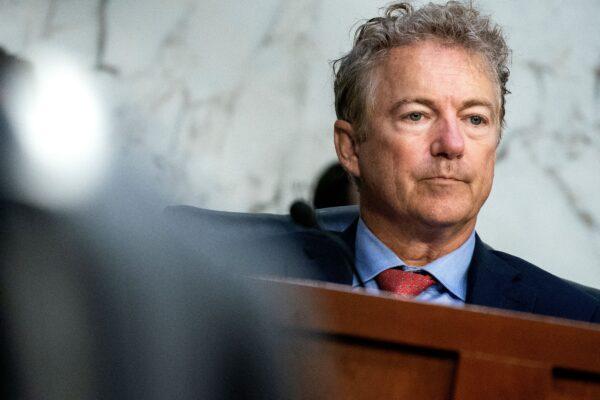World leaders weigh liquidating frozen Russian assets to assist Kyiv.
Members of the Group of Seven (G7) have discussed using seized Russian assets to help rebuild Ukraine’s infrastructure, which would be a “critical” tool following Moscow’s invasion, according to U.S. Secretary of State Antony Blinken on Friday.
While speaking to reporters at a G7 meeting of foreign ministers in Italy, Mr. Blinken confirmed that the subject of Russia’s assets has been on the agenda. Officials are working toward solutions that are consistent with international law.
While the Kremlin has labeled this proposal as “theft,” the senior White House official argued that the real theft has been countless Ukrainian deaths, the destruction of the country’s infrastructure, and seized land.
“Being able to use these Russian sovereign assets to help rebuild Ukraine is critical,” Mr. Blinken said. “And it’s also something that one way or another, one day or another, is going to happen.”
He added that it is a “complement but not a substitute” for the assistance the global community is providing in Ukraine’s war effort.
At the onset of the war in February 2022, the United States and its allies froze about $300 billion in Russian central bank assets.
To Seize or Not to Seize? Washington’s Dilemma
Earlier this year, the Senate Foreign Relations Committee overwhelmingly approved the Rebuilding Economic Prosperity and Opportunity (REPO) for Ukrainians Act, a bill that would confiscate the Russian central bank’s assets and direct President Joe Biden to work with the nation’s partners “to take similar action.”
Since then, the White House has expressed support for the proposal to liquidate the assets and transfer the proceeds to Kyiv.
At a news conference during the spring meetings of the International Monetary Fund (IMF) and World Bank, Treasury Secretary Janet Yellen conceded that the United States and its G7 allies are pursuing various strategies to exploit these windfalls to support the Ukrainian people. She also pushed Congress to approve financial and military support efforts quickly.
“This is a humanitarian and moral imperative, and also an economic war, given the war’s significant negative impact on economies around the world,” Ms. Yellen told reporters. “I do fear that Russia is beginning to see signs that the U.S. and our allies are tiring or finding it more difficult to find ways to support Ukraine, and that gives them hope that they can outlast us and wait for our resolve to crumble.”
Her remarks come weeks after the Treasury secretary offered her first public endorsement of appropriating these assets to cover the cost of Ukraine’s military operations and post-war construction.
“I believe there is a strong international law, economic, and moral case for moving forward. This would be a decisive response to Russia’s unprecedented threat to global stability,” Ms. Yellen explained at a February G20 meeting of central bank governors and finance ministers in São Paulo, Brazil.
Several Republicans have cautioned against this concept.
Sen. Rand Paul (R-Ky.) was the lone “no” vote during the Senate committee’s vote on the REPO Act.
In an opinion piece shared with The Epoch Times, Mr. Paul warned that the Senate measure “would breed contempt and prolong the war in Ukraine.” The former presidential candidate argued that confiscating Russia’s assets would convince President Vladimir Putin “that there is no negotiated settlement to be had with Ukraine.”

“The result will be a destroyed Ukraine. More Ukrainian soldiers and civilians will die, and more cities and towns will be turned to rubble,” Mr. Paul said.
“This bill will hand the Russians another tool to fuel resentment against the United States. American leaders speak of a ‘rules-based international order,’ but the theory that the United States can confiscate the assets of another country we are not at war with is legally dubious.”
In an April 15 memo to his colleagues, Sen. J.D. Vance (R-Ohio) warned that this “unprecedented” idea will “boomerang” on the United States.
First, he believes this would undermine the global appeal of safe-haven U.S. Treasury securities that help fund operations in Washington. “If a central bank’s holdings in Treasurys, or any other asset, could vanish at the snap of a finger, it is likely that there will be a decline in parties willing to both attend Treasury’s weekly auctions and purchase Treasurys through dealers,” he wrote.
Second, liquidating foreign assets would empower Russia, China, and other countries at the expense of the U.S. financial system because they would explore alternatives to the information transfer and payment settlement apparatuses, such as China’s Cross-Border Interbank Payment System and Russia’s System for Transfer of Financial Messages. Both are analogous to the Society for Worldwide Interbank Financial Telecommunications (SWIFT) system used in the West.
Finally, it would tie the hands of future U.S. presidents, Mr. Vance noted.
“Negotiating peace is a delicate matter. To be successful, the president requires leverage and flexibility,” he said. “Removing the president’s ability to end or alter a sanctions regime, especially in the context of such a significant conflict, would dramatically limit U.S. negotiating leverage, thereby undermining the prospect of reaching a peace deal in the Russia–Ukraine war.”
What Foreign Leaders Say
At a press conference with Mr. Blinken, UK Foreign Secretary David Cameron revealed that progress had been made in employing these funds and contended that the issue would be accomplished at the next G7 summit.
“We know that they need money in the form of the frozen Russian sovereign assets, and we’re making good progress in how to access these funds on an agreed basis,” he told reporters.
According to European Commission President Ursula von der Leyen, the first stage of selling the assets could happen as early as July 1.
“I told the leaders that if we are swift now in concluding the proposal, we could disburse the first billion on July 1. So it depends on us, it’s in our hands.” Ms. Von der Leyen said at the March European Union leaders’ summit in Brussels.
Last month, EU Chief Diplomat Josep Borrell recommended redirecting interest generated from the frozen Russian assets to Kyiv. Mr. Borrell’s plan would also allocate 90 percent of the funds to an account in Ukraine utilized explicitly for weapons.
Earlier this month, IMF Managing Director Kristalina Georgieva and Ukrainian Prime Minister Denys Shmyhal discussed creating “a respective international mechanism” to confiscate Russian assets and use them for Ukraine’s defense.
Gita Gopinath, the IMF deputy managing director, noted in an interview with Foreign Policy magazine that any program must be backed with “sufficient legal support” to avoid future challenges. She confirmed that the IMF would not be involved in the decision.
Original News Source Link – Epoch Times
Running For Office? Conservative Campaign Consulting – Election Day Strategies!


